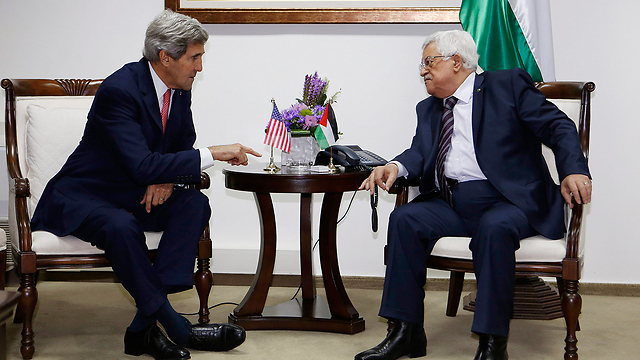
Palestinians rejected ideas raised by visiting US Secretary of State John Kerry on Thursday for security arrangements under a possible future peace accord with Israel, a Palestinian official said.
The official, who spoke on condition of anonymity and declined to elaborate on the proposals, said Kerry presented them to Palestinian President Mahmoud Abbas after discussing them separately with Israeli Prime Minister Benjamin Netanyahu.
Related stories:
- Kerry: Progress made in peace talks
- Kerry's visit to Israel to focus on Iran deal
- Arab MKs: Kerry, prevent ethnic cleansing
"The Palestinian side rejected them because they would only lead to prolonging and maintaining the occupation," the official said, referring to Israel's hold on the West Bank, among territories where Palestinians seek statehood.
Earlier Thursday, US Secretary of State John Kerry met with Abbas, whom he praised for sticking with the so-far fruitless negotiations "despite difficulties that he and Palestinians have perceived in the process."
The talks, which face a March deadline for a resolution, have entered their fifth month without any major breakthroughs.
"The interests are very similar, but there are questions of sovereignty; questions of respect and dignity, which are obviously significant to the Palestinians and Israelis; very serious questions security and also of longer term issues of how we end this conflict once and for all," said Kerry, who struck a more conciliatory tone after meeting with Abbas for just over three hours.
"We, I think, made some progress," said Kerry, who raised the possibility of returning in about a week to resume the discussions.
Abbas was not immediately available after the talks and did not join Kerry in his brief comments to reporters.
Israel currently has military control of the West Bank and does not want to give it up. But a possible part of the US plan could call for stationing international forces along the West Bank border with Jordan, although officials on all sides have refused to discuss the details.
It's also possible that Israel would be in control of the international forces, in an uneasy compromise to try to appease both sides.
"If this process is going to continue, we're going to have to have a continual negotiation," Netanyahu said. He cited a need "to have these real discussions inside in a sustained effort to bridge historic gaps and provide security."
The meeting in Jerusalem – which will continue Thursday night during a private dinner – sought in part to placate Netanyahu after world powers reached a tentative agreement with Iran last month over curbing Tehran's nuclear program in a separate deal that infuriated Israel. Netanyahu warned anew Thursday against easing harsh sanctions against Iran.
"Steps must be taken to prevent further erosions of sanctions," Netanyahu said.
Kerry said the US will remain "vigilant" in enforcing sanctions against Iran, including the harshest measures that have crippled the Islamic republic's oil and banking industries. However, the Obama administration is pushing back against new sanctions against Iran, as offered by some lawmakers in Congress. Such a move could be seen as a heavy-handed, bad-faith tactic at a delicate time in the negotiations.
Even so, "Israel's security in this negotiation is at the top of our agenda," Kerry said, referring to the talks with Tehran. "And the United States will do everything in our power to make certain that Iran's nuclear program – a program of weaponization possibilities – is terminated."
- Receive Ynetnews updates
directly to your desktop
















